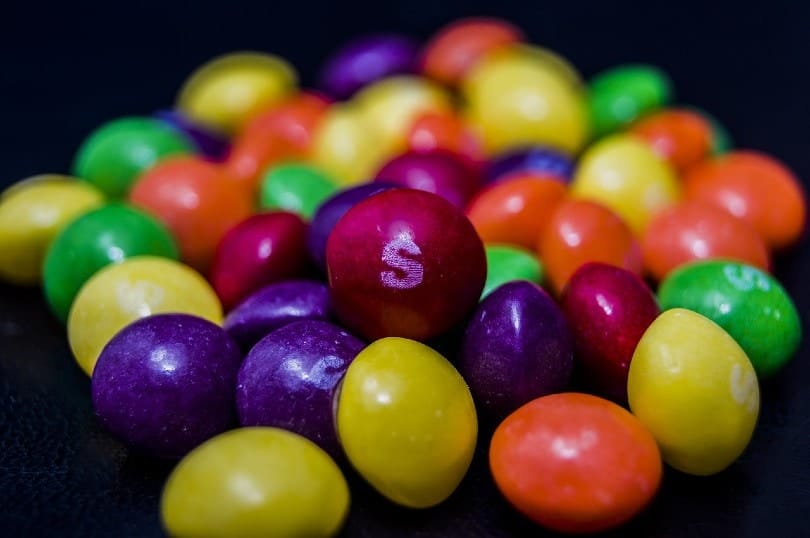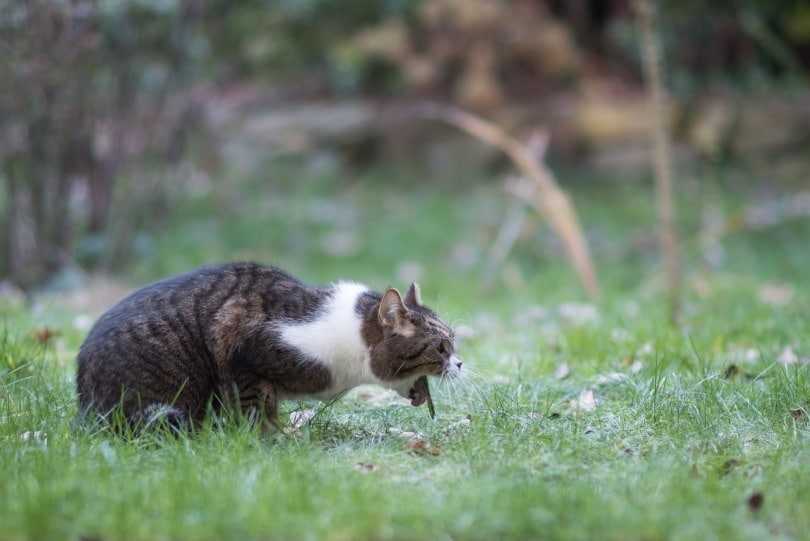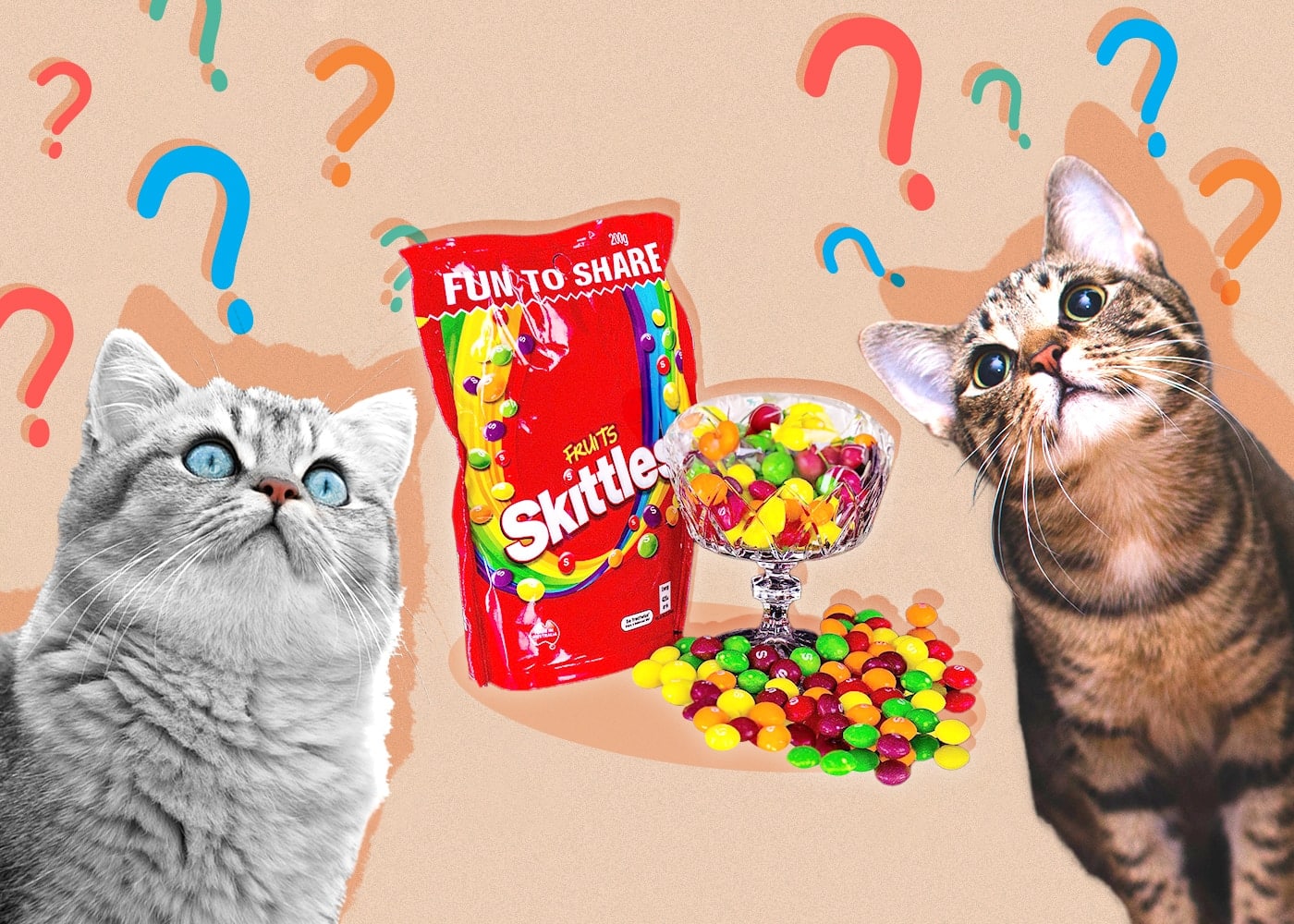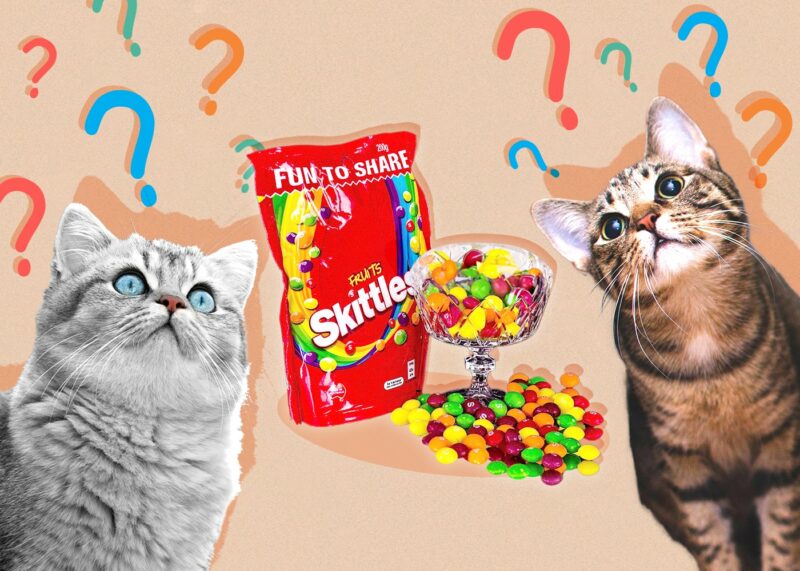Like humans, cats love the occasional treat. While we might reach for gummy bears or Skittles when our sweet tooth acts up, the same cannot be said for our feline companions. Not only do cats not crave sweets as we do, but their digestive systems aren’t equipped for digesting them that well either, depending on the type and amount of carbohydrates.
So, should you offer your kitty a Skittle or two during your next movie night? The answer is no, cats should not eat Skittles. Keep reading to learn why you shouldn’t give your cats a taste of the rainbow and what you can give them instead.
Do Cats Like Candy?
A cat’s senses do not act the same as ours do. Their taste buds have evolved to a point where they’re attracted to the foods they need to survive. Most mammals are attracted to simple sugars and their sweet profile as they need them to survive. Cats, however, lack the receptors necessary to taste the sweetness, so they are not attracted to candy and other sugary things.
Since they cannot taste sweet things, most won’t try to sneak sugary snacks simply because of their sweetness.1 Some cats, however, may act interested in certain candies because of their texture and fats present in them and not because of how yummy they are. However, most cats may just consider it a fun object to toss around rather than a source of nutrition.

What Happens if My Cat Eats Sugar?
Sugar isn’t toxic for your cats, but it isn’t necessarily good for their digestive systems in excessive amounts. It isn’t harmful if it’s consumed in a small amount, but higher amounts of sugar in their diet can cause some unfortunate side effects for your kitty. Cats’ diets are based on their high need of protein and fat, while they don’t have any specific requirements when it comes to carbs and have lower enzyme activity for digesting carbs in comparison to dogs. They can digest small amounts of properly prepared and cooked carbs, such as starch present in commercial, high-quality cat food, and use it as energy, but they cannot digest sugars, such as fructose present in fruit.2
You might notice digestive upset like vomiting or diarrhea if your kitty has gotten into your sweets stash. The severity of these signs will depend on how much your cat has eaten and how sensitive they are. The stomach upset may have been provoked due to your cat not being used to eating such foods.
Currently, there is limited evidence to suggest that excess carbs actually lead to obesity in cats, although it seems that dry cat food available at all times or fed excessively will predispose cats to obesity. Dry food does often contain more carbs than wet food, but it can also be more calorie dense. Further research is required into the exact mechanism and role of carbs when it comes to obesity and health in cats.
Do Skittles Contain Toxic Ingredients?
While sugar itself isn’t toxic to cats, there are some ingredients in certain sweets and candy that can be very toxic.
Artificial sweeteners like xylitol are very dangerous for both cats and dogs. The sweetener can cause an upset stomach, liver damage, dangerous drops in blood sugar, and even seizures or death, particularly in dogs, while further research is required into its potential harmful effects in our feline companions.
Chocolate is another very toxic ingredient for pets. The darker the chocolate is, the more toxic.
Skittles do not contain artificial sweeteners or chocolate. It does contain sugar, corn syrup, and hydrogenated palm kernel oil, though, all very unhealthy ingredients for humans, let alone for a cat’s sensitive digestive system.
Skittles manufacturers use several food dyes to get the coloring for the candies. There is limited information on safety of these dyes, but some of them that are present in Skittles and are approved by the FDA are at the same time prohibited in Europe, such as Red 40. Such compounds are used to change the food’s appearance and make it more appealing to humans while having absolutely no nutritional value. It’s unknown if food dyes may cause allergic reactions in pets, as cats and dogs are usually allergic to proteins, but Red 40 has been associated with allergies in people.
Another consideration is the size and shape of one Skittle. They may certainly pose a choking hazard risk in some pets, who may try to swallow them whole or find them too hard to bite into. This is another reason why they should always be avoided in cats.

What’s a Better Treat Than Candy for Cats?
When we want to treat ourselves, we reach for candy or ice cream. Just because we can’t (or, shouldn’t) give the same type of treats to our cats doesn’t mean we can’t provide them with something tasty for special occasions. Put away the candy and the chocolate and give them a nibble of something savory.
Small pieces of cooked chicken or turkey without any spices or sauces are a savory and tasty treat that’s sure to appease your kitty’s taste buds. Remove all the bones and chop the meat into smaller, bite-sized pieces.
Catnip and cat grass are great low-calorie treats. You can grow both yourself in a sunny window and find both fresh and dried greens at most pet stores. Offer cat grass in small amounts at first to see if your cat likes it, and keep the other house plants out of their reach. Toxic plants should not have a place in your home, as it’s challenging to keep cats away.
Commercial cat treats are another great go-to option. Choose an option that’s both healthy and tasty to both indulge them and give them a boost of nutrients.
How Can I Keep My Pet Safe From My Human Treats?
While your cat is unlikely to become severely ill from eating one or two Skittles, you shouldn’t leave them (or any food your cat shouldn’t get into) anywhere they might find them. A bowl of Skittles on the kitchen counter can easily be reached by your kitty.
Here are some tips to consider to keep your cat out of your treats.
The first (and easiest) method is to keep treats out of reach. Your snacks should be secured in cupboards so curious kitties can’t get into them. A bag of goodies on the counter is no match for a determined cat as they can use their claws to rip into it. If you don’t want to store your sweets in the cupboard, consider a lockable and tightly sealed container. Luckily, most cats won’t be that fussed about Skittles, but they may attempt to play with them, and now and then, there will be a cat that will eat almost anything they can find.
Next, ensure your garbage can is not easily accessible. Avoid using open trash cans and instead choose ones with a lid that can be tightly secured. Cats aren’t afraid to go dumpster diving if they smell something yummy in the garbage. A cat-proof trash can will keep your kitty out of trouble and prevent big messes.
Teach your children about your pets and why they can’t have certain types of human foods. If your child wants to offer your kitty a treat here and then, go over the healthy (and safe) treat options they can give your pets.

What Do I Do if My Cat Ate Skittles?
We always recommend erring on the side of caution. If you know that your cat has gotten into your treat stash, give your vet a call and see what they suggest. They might recommend keeping an eye on your pet to see if they start showing any concerning signs, or they may suggest you bring your cat in for an examination.
You should be prepared to provide information like how much your cat ate and what, the exact list of ingredients from the package, how long ago they ate it, and if they’re currently showing any negative signs.
Final Word
While a Skittle or two won’t cause serious harm to most cats, it’s still best to keep these yummy treats for yourself. Ingesting candy like Skittles can cause digestive upset to your cat or may pose a choking hazard, and it’s best to avoid that at all costs. If you find your cat begging for a treat from your plate, offer them a piece of bone-free chicken or some tuna instead. Not only will they find those foods tastier, but meaty treats are better for them, too.
Featured Image Credit: 2092512, Pixabay













